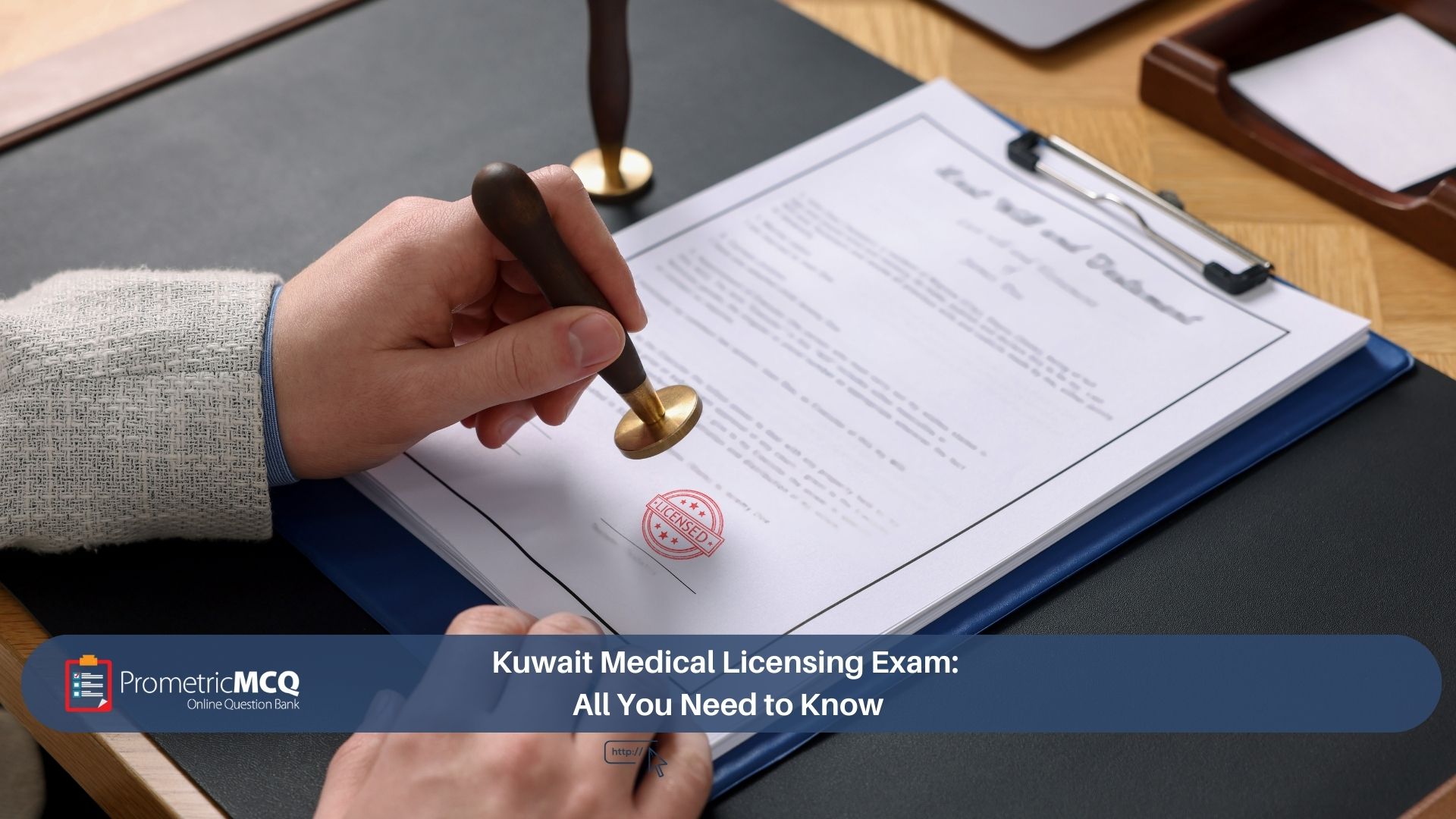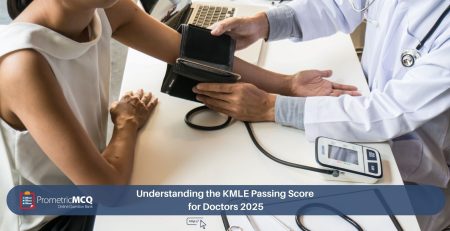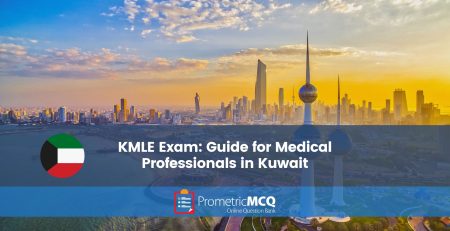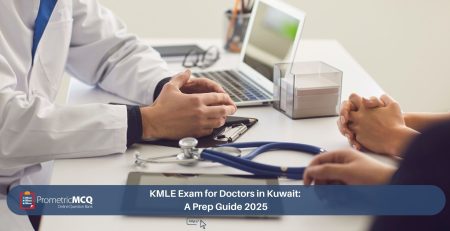
Kuwait Medical Licensing Exam: All You Need to Know
fatima@prometricmcq.com2025-09-24T14:14:39+00:00Table of Contents
ToggleKuwait Medical Licensing Exam (KMLE): All You Need to Know (2025)
Kuwait stands as a prominent hub in the Gulf region, boasting a highly advanced, well-funded, and rapidly growing healthcare sector. For international healthcare professionals, it represents a land of immense opportunity, offering the chance to work with cutting-edge technology and a diverse patient population. However, entry into this prestigious system is governed by a strict regulatory framework designed to ensure the highest standards of patient care and safety. The cornerstone of this framework is the Kuwait Medical Licensing Examination (KMLE).
Administered by the Kuwaiti Ministry of Health, the KMLE is a mandatory licensure exam for all expatriate healthcare professionals seeking to practice in the country. It is a comprehensive, computer-based assessment that validates a practitioner’s knowledge, skills, and clinical judgment against internationally recognized benchmarks. Navigating the journey from initial application to receiving a license can seem complex, involving multiple steps from credential verification to the final exam.
This ultimate 2025 guide is designed to be your single, all-encompassing resource for the KMLE. We will demystify the entire process, providing a clear, step-by-step roadmap for all professions—from doctors and dentists to nurses, pharmacists, and allied health specialists. We’ll break down the exam pattern, delve into the core syllabus for each category, and answer your most pressing questions in a detailed 10-point FAQ. Our goal is to provide a complete and actionable blueprint that transforms the complex licensing process into a clear and manageable path to your career in Kuwait.
Key Takeaways on the KMLE Process
- A Universal Requirement: The KMLE is mandatory for all expatriate healthcare professionals (doctors, dentists, nurses, pharmacists, etc.) to obtain a license to practice.
- Two Core Components: The licensing process involves two main hurdles: the Primary Source Verification (PSV) of your credentials by DataFlow, and passing the computer-based KMLE exam.
- Prometric-Administered Exam: The KMLE is a Computer-Based Test (CBT) consisting of Multiple-Choice Questions (MCQs), administered globally at secure Prometric centers.
- Focus on Clinical Competence: The exam is not an academic test of facts but a practical assessment of your clinical reasoning and decision-making skills in real-world scenarios.
- No Negative Marking: Your final score is based on the number of correct answers. It is crucial to attempt every question.
What is the KMLE and Who Needs to Take It?
The Kuwait Medical Licensing Examination (KMLE) is the official licensure exam mandated by the Ministry of Health (MOH) of Kuwait. Its primary purpose is to ensure that healthcare practitioners seeking to work in the country possess the necessary competence and knowledge to provide safe and effective patient care. For a general overview of the exam’s importance, you can review our main KMLE exam questions guide.
The KMLE is a requirement for a wide range of healthcare professions, including but not limited to:
- Physicians: General Practitioners and all Specialists (e.g., Internists, Pediatricians, Surgeons).
- Dentists: General Dentists and all Specialists (e.g., Orthodontists, Endodontists).
- Nurses: Registered Nurses and specialized nursing roles.
- Pharmacists: Clinical Pharmacists and Pharmacy Technicians.
- Allied Health Professionals: Physiotherapists, Medical Laboratory Technicians, Radiographers, Dietitians, and more.
Essentially, if your role involves direct patient care, you will be required to pass the KMLE for your specific profession to obtain a license.
The A-to-Z Licensing Process: A Step-by-Step Guide
Navigating the administrative requirements is a critical part of the process. Follow these steps methodically to ensure a smooth journey.
Step 1: Check Your Eligibility Requirements
Before you begin, visit the official Kuwait Ministry of Health website or a trusted advisory service to confirm the eligibility criteria for your profession. This typically includes requirements for educational qualifications (e.g., Bachelor’s, Master’s, MD) and a minimum number of years of post-qualification clinical experience.
Step 2: Credential Verification (PSV by DataFlow)
The MOH requires all your professional documents to be authenticated through Primary Source Verification (PSV). This process is handled by the DataFlow Group, which will contact your universities, previous employers, and licensing bodies directly to confirm the authenticity of your certificates. You must submit your documents and pay the required fees to DataFlow to initiate this process. A positive DataFlow report is mandatory for your license.
Step 3: Book Your KMLE Exam with Prometric
Once you receive your eligibility or reference number from the MOH (often after initiating the DataFlow process), you can book your exam date. You will do this directly on the Prometric website. You can choose a date, time, and test center location that is convenient for you from their global network.
Step 4: Prepare For and Pass the KMLE
This is the most critical phase. Based on the syllabus for your profession, you must undertake a structured and intensive study plan. The most effective preparation involves using high-quality question banks (QBanks) to practice with thousands of MCQs that simulate the real exam environment. This is where a targeted resource like PrometricMCQ’s packages becomes invaluable.
Step 5: Secure a Job Offer
Your “Pass” result from the KMLE makes you eligible for employment in Kuwait. You can now actively apply for positions in public or private hospitals and clinics. Your employer will need your exam pass certificate and your positive DataFlow report to proceed with the final licensing steps.
Step 6: License Issuance by the Ministry of Health
Once you have a job offer, your employer (acting as your sponsor) will submit all the required documents—including your exam result, DataFlow report, and employment contract—to the Ministry of Health. Upon approval, the MOH will issue your official license to practice medicine in Kuwait.
KMLE Exam Pattern and Syllabus by Profession
While the overall format is consistent (150 MCQs in 3 hours), the content varies significantly. Here is a high-level overview of the syllabus focus for major professions.
General Practitioners (GPs)
- Core Focus: Breadth of knowledge across all major medical fields.
- High-Yield Topics: Internal Medicine (Cardiology, Endocrinology, Pulmonology) is the largest component. This is followed by Pediatrics (common infections, milestones), OB/GYN (antenatal care, common complications), and the initial management of surgical and medical emergencies. For a deeper dive, our KMLE guide for medical professionals is a must-read.
Dentists
- Core Focus: Diagnosis and treatment planning, especially with radiographic evidence.
- High-Yield Topics: Oral Medicine & Radiology (interpreting OPGs, identifying lesions), Operative Dentistry (materials, cavity prep), Endodontics (pulp diseases), Oral Surgery (extractions, LA), and Periodontics.
Nurses
- Core Focus: Patient safety, clinical prioritization, and application of the nursing process.
- High-Yield Topics: Fundamentals of Nursing, Medical-Surgical Nursing (management of common adult conditions), Pharmacology (especially dosage calculations), Infection Control, and Delegation.
Pharmacists
- Core Focus: Clinical therapeutics, pharmacology, and pharmaceutical calculations.
- High-Yield Topics: Pharmacotherapy of common chronic diseases (diabetes, HTN, asthma), pharmaceutics, pharmacokinetics, and complex dosage calculations. Unlike some other Gulf exams, the KMLE for pharmacists is more focused on clinical science than local law.
Frequently Asked Questions (FAQs) on the KMLE Process
The timeline can vary significantly based on how quickly your documents are verified by DataFlow and your exam preparation time. A realistic estimate from starting the DataFlow process to receiving your license after securing a job is 4 to 6 months. Starting your PSV verification early is key to avoiding delays.
The official result is only Pass/Fail. However, the unofficial benchmark for most professions is widely accepted to be around 60-65%. To ensure you pass comfortably, you should aim to score above 70% consistently in your practice tests. We explore this in detail in our guide to the KMLE passing score for doctors.
Fees can change, but you should budget for several components: DataFlow PSV fees (which vary by the number of documents), MOH application fees, and the Prometric exam fee itself. The total cost can range from $500 to $1000 USD, excluding any study materials.
Yes. Because the KMLE is administered by Prometric, you can take the exam at any authorized Prometric test center in the world. You do not need to be in Kuwait to sit for the exam.
The single most effective study tool is a high-quality question bank (QBank) that provides thousands of MCQs with detailed rationales. This active learning method is far superior to passively reading textbooks. The questions should be case-based and mirror the style of the actual exam.
Your KMLE pass result is typically valid for one year from the date of issuance. You must secure a job and have your employer initiate the final licensing process within this one-year window.
You will typically need to submit clear scanned copies of your passport, a passport-sized photo, your educational degrees/diplomas, transcripts, internship completion certificates, medical/professional licenses from all jurisdictions, and certificates of good standing. For experience, you’ll need service certificates from previous employers.
The Ministry of Health typically allows candidates a total of three attempts to pass the exam. There is usually a waiting period between attempts. It is crucial to use this time to identify your weak areas and adopt a more effective, question-based study strategy.
The KMLE exam is conducted exclusively in English. While knowing Arabic is a great advantage for communicating with patients and is highly encouraged, it is not a requirement for passing the exam or for working in most major hospitals, where English is the primary language of medical communication.
Yes. The KMLE is based on international, evidence-based standards of care. Preparing with the latest guidelines from major international bodies (e.g., AHA for cardiology, GINA for asthma) is the correct approach. For example, staying updated with global health advisories from organizations like the Centers for Disease Control and Prevention (CDC) ensures your knowledge is current.
Conclusion: Your Comprehensive Path to a Kuwait Career
The journey to obtaining a medical license in Kuwait is a structured and rigorous process, but it is a clear and manageable one. By understanding each step—from eligibility and credentialing to the specific demands of the KMLE for your profession—you can navigate the path with confidence. The exam itself is the ultimate test of your clinical competence, a challenge that can be met and overcome with a disciplined, strategic, and practice-focused preparation plan. Embrace the process, commit to your preparation, and you will be well on your way to a rewarding healthcare career in the vibrant nation of Kuwait.
Begin Your Journey to Kuwait with Confidence.
Our comprehensive question banks are tailored for every major healthcare profession, providing thousands of high-yield scenarios, detailed rationales, and simulated exams to guarantee your success.










